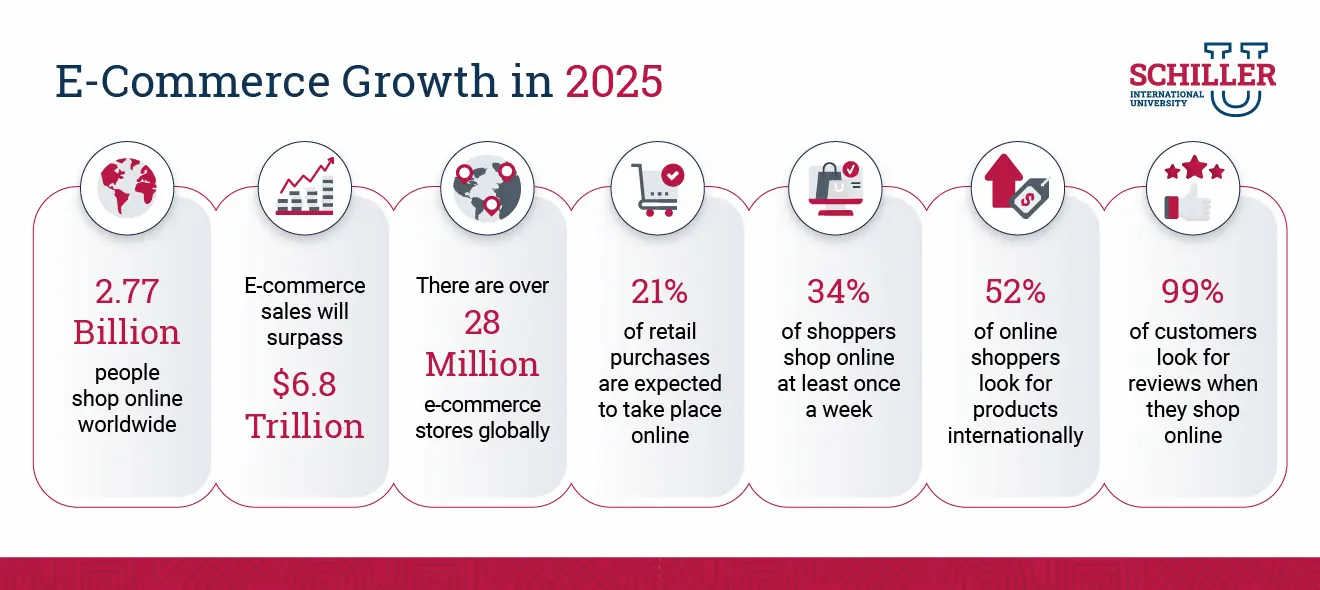As the world becomes increasingly interconnected, the future of e-commerce is transforming at an unprecedented pace. Driven by the fact that more than a third of the global population makes purchases online, the e-commerce sector has grown into a $6.8 trillion market, with projections indicating it will exceed $8 trillion by 2027. (1)
The ongoing advancements in e-commerce heavily influence this surge in digital marketing, which is redefining how businesses engage with consumers. Businesses are no longer just selling products; they create engaging customer journeys spanning multiple platforms by leveraging digital marketing strategies to enhance their reach and to improve customer engagement.
This evolution is driven by cross-border e-commerce, which has opened up new markets and opportunities for businesses worldwide. The shift towards cross-border e-commerce opens new avenues for trade, allowing brands to connect with consumers globally. A recent study found that 70% of consumers prefer to shop online due to the convenience and personalized experiences that digital platforms offer (via McKinsey & Company).
Evolution of Digital Marketing in E-commerce
Since the birth of the internet in 1983, marketing has evolved rapidly. Digital marketing is now integral to any e-commerce business, from production-centric promotions to highly specialized services. A staggering 95% of all purchases will occur through e-commerce platforms by 2040, according to several forecasts. (2) Therefore, an understanding of this evolution is more than helpful, as it is necessary for anyone aiming to excel in international business.
Key Transformations:
- From Mass Marketing to Personalization: Marketing has shifted from one-size-fits-all broadcasts to tailored experiences.
- The Rise of Data-Driven Decisions: Analytics tools now allow precision targeting and campaign optimization.
- Mobile-First Approach: Smartphones have reshaped how consumers interact with brands.
Impact of Digital Marketing in E-Commerce
Digital Marketing is not just a buzzword—it is the engine driving e-commerce that enables businesses to connect with customers across borders, personalize shopping experiences, and adapt to rapidly changing market dynamics. Digital marketing is critical in e-commerce by allowing companies to reach a broader audience and create personalized experiences. From SEO and SEM to social media marketing and content marketing, every aspect of digital communication plays a role in shaping the customer journey and driving sales in e-commerce.
Consider the evolution of search engine optimization (SEO). Early tactics focused on keyword stuffing. Modern SEO emphasizes quality content, user experience, and mobile optimization. This evolution has given rise to new concepts such as digital branding, inbound marketing, and strategies focused on attracting customers through valuable content and personalized experiences.
The Role of Digital Marketing in E-commerce
Digital marketing is about promoting products and crafting a brand identity that resonates with consumers. Techniques such as search engine marketing (SEM), social media marketing (SMO), and content marketing help businesses build strong online presences and engage with customers more effectively, which are essential tools for any e-commerce strategy.
Strategies for Success
|
Strategy |
Description |
|
SEO |
Optimizing website content for search engines to improve visibility. |
|
SMO |
Leveraging social media platforms to enhance brand awareness and engagement. |
|
SEM |
Using paid advertising on search engines to reach target audiences. |
How Digital Marketing is Redefining Global Trade
Integrating digital marketing into e-commerce has transformed global trade by facilitating cross-border e-commerce. This shift allows businesses to expand into new markets, leveraging digital platforms to reach consumers worldwide.
Benefits of Cross-Border E-commerce
- Market Expansion: Access to global markets without physical presence.
- Cost Efficiency: Reduced operational costs compared to traditional retail models.
- Customer Reach: Ability to target diverse consumer bases across different regions.
E-commerce Trends and Technologies in 2025
Looking ahead to e-commerce trends in 2025, several technologies are poised to shape the industry:
1. Personalization and AI

Consumers want personalized shopping experiences. Now more than ever. Generic storefronts no longer cut it. Shoppers want interactions tailored to their preferences, behaviors, and past interactions.
Artificial intelligence (AI) and machine learning are crucial to meeting these expectations. AI enables businesses to deliver customized experiences, building customer loyalty and boosting conversion rates. Consider these examples:
Product recommendations based on browsing history
Personalized email marketing campaigns
Dynamic pricing based on demand
Advanced web analytics helps in understanding user experiences deeply to provide tailor-made solutions.
2. Cross-Border E-commerce

Cross-border e-commerce is experiencing explosive growth. As domestic markets become saturated, businesses are looking internationally to expand their reach. Cross-border e-commerce simplifies complexities such as payment processing, logistics, and compliance. According to some reports, the growth rate for cross-border e-commerce outpaced domestic e-commerce in 2023, showing how important it is for brands to expand globally. It is a significant step forward.
3. Mobile Commerce

Mobile commerce, or m-commerce, is on the rise. Smartphones are increasingly the primary internet access point, particularly in emerging markets. Businesses must prioritize a mobile-first approach, providing a seamless shopping experience from discovery to checkout.
Asian shoppers, for example, strongly prefer mobile shopping experiences and social commerce platforms. In many regions, smartphones are the primary access point to the internet, making a mobile commerce-first approach necessary, especially for international businesses. This trend highlights the importance of localizing e-commerce platforms for mobile preferences around the globe.
Consider these factors driving the trend:
- Increased Smartphone Adoption: More people have smartphones and shop online using mobile devices.
- Improved Mobile Payment Solutions: Mobile wallets make it easier to purchase from anywhere.
- Enhanced Mobile User Experience: Streamlined navigation for a better shopping experience while on the move.
4. Social Commerce Evolution

Social media marketing is not just about likes and shares anymore. E-commerce functionalities are increasingly integrated, meaning consumers can buy directly through social platforms. Platforms such as TikTok have transformed.
The convergence of social media marketing and online retail offers businesses a great chance to make direct sales from their social media marketing.
5. Sustainable E-commerce

Sustainability is a growing concern for consumers. Customers are paying attention to the environment, making sustainability a crucial factor for many shoppers. Eco-conscious online shoppers want businesses that share their values and advocate for sustainable practices. Think of eco-friendly packaging and carbon-neutral shipping. Brands improve customer loyalty while contributing to a healthier planet.
Implementing sustainable practices, such as eco-friendly packaging and carbon-neutral shipping options, can enhance brand reputation and foster customer loyalty.
Examples of sustainable practices:
- Reducing packaging waste
- Using recycled materials
- Offering carbon-offsetting options
6. Payment Innovations

Facilitating smooth cross-border transactions is crucial. Innovations in payment technology, such as blockchain and mobile wallets, offer secure and efficient methods for international payments. As businesses broaden their reach, secure methods are needed to protect against e-commerce fraud, which is predicted to increase even further. Providers introduce more sophisticated algorithms to fight this, providing risk scoring in milliseconds.
Merchants can bridge profitability gaps with maximum payment acceptance. Consumer trust must be maintained by ensuring businesses offer various payment options.
7. Voice Commerce

Remember voice commerce? Even though momentum slowed, AI in voice assistants voice commerce may change the way we shop. As voice-activated assistants become more prevalent, consumers will increasingly use voice search to make purchases. Optimize platforms for voice search, emphasizing natural language processing, in every substantive market to facilitate the emerging mode of shopping.
E-commerce platforms must optimize voice search, focusing on natural language processing and conversational AI. This emerging mode of shopping experience presents new opportunities for businesses.
New Markets Emergence

Emerging economies are becoming major players in digital commerce. For instance, regions such as Latin America and the Middle East show huge promise. The online consumer base is growing thanks to increasing internet penetration and mobile device usage. These markets offer fresh opportunities for e-commerce ventures. International products are in high demand and there is less competition. The Latin American e-commerce market is projected to grow significantly, reaching substantial volumes between 2023 and 2026. (3) The Middle East also presents considerable growth potential with its young, technology-savvy population.
Emerging E-commerce Markets
|
Region |
Key Drivers |
Opportunities |
|
Latin America |
Increased internet access, mobile adoption. |
Untapped consumer base, growing demand. |
|
Middle East |
Young population, high technology adoption. |
High purchasing power, appetite for global brands. |
Why International Trade Matters
Global e-commerce relies on international trade, which sustains the world economy. By linking a diverse market to a large customer base, enterprises may accomplish their objectives and expand more rapidly. Businesses benefit by growing their audience, expanding sales, and accessing new goods and services to improve their services. Newer technologies emerge and push numerous sectors forward because more businesses are offered to more countries, resulting in healthier rivalry.
The Importance of Education in Digital Marketing and E-commerce
For international students interested in the future of e-commerce, pursuing a degree in digital marketing and e-commerce can provide a competitive edge. Schiller International University's Master of Science in Digital Marketing and E-commerce program offers comprehensive training in the latest trends and technologies, equipping students with the skills needed to succeed in this rapidly evolving field.
How Schiller International University Can Help
With campuses in Europe and the United States, Schiller provides a truly global education experience, allowing you to learn about international markets firsthand. In this program, you will explore key areas, from SEO and social media marketing to data analytics and consumer behavior. Whether you aim to launch your e-commerce venture or lead marketing initiatives for a global brand, this program provides a solid foundation.
The program offers:
- Comprehensive curriculum covering key aspects of digital marketing and e-commerce.
- Hands-on experience with innovative tools and technologies.
- Global perspective, preparing you to succeed in international markets.
- Expert faculty with industry experience.
Enhance Your Future in E-Commerce
The future of e-commerce presents considerable opportunities for those prepared to embrace digital marketing's power. As e-commerce trends in 2025 continue to evolve, professionals need to stay informed and adaptable. Understanding how digital marketing reshapes global trade is not just about selling products.
It is about crafting meaningful customer relationships, adapting to shifting consumer behaviors and embracing innovations that redefine the global marketplace. For international students seeking a valuable career path, digital marketing innovations are vital in excelling and adapting your plans around. Consider how a Masters in Digital Marketing and E-commerce from Schiller International University can enhance your future.
Study MSc in Digital Marketing and E-commerce at Schiller

 Request information
Request information









